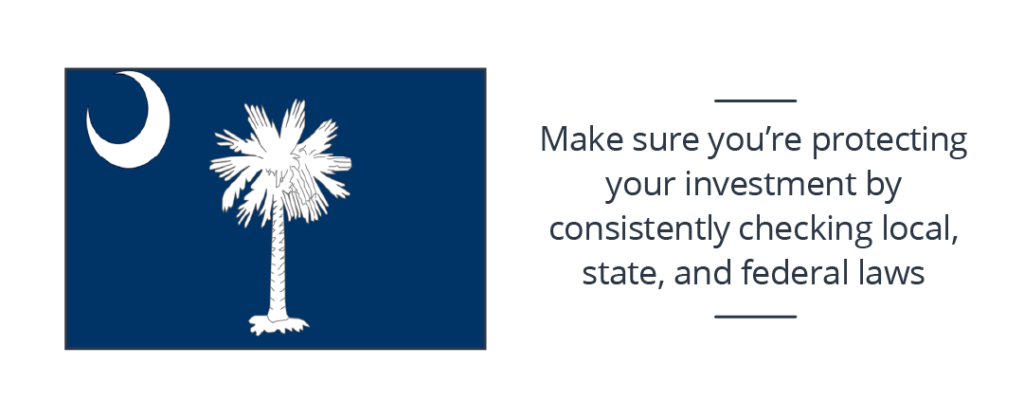South Carolina has everything: history, great weather, and close proximity to beaches and mountains – all of which make it an ideal location for those looking to relocate, and in turn, property investors. South Carolina is also very affordable for new investors, and with rental demand increasing, landlords don’t have to worry about filling vacancies.

Laws that impact the rental market, landlords, and tenants are constantly being decided in states. Make sure you know what’s on your ballot – find South Carolina voting information.
Marketing. Applications. Leases. Payments.
South Carolina Renters’ Rights and Landlord Responsibilities
- Have 30 days to return security deposit
- No notice required before raising rent
- 24-hour notice required before entering the property
- Required to make repairs within 14 days

When it comes to South Carolina rental laws, there are a few specifics landlords need to know:
- Security Deposit – South Carolina does not limit the amount a landlord may charge for the security deposit. However, landlords must return the deposit within 30 days of the tenant moving out.
- Raising Rent – Landlords in South Carolina may increase the rent to any amount for any reason with no notice.
- Notice of Entry – South Carolina requires a 24-hour notice from the landlord before entering.
- Repairs – It is the landlord’s responsibility to keep the rental in safe and healthy living conditions. Landlords must make repairs within 14 days of being notified by the tenant. If they fail to do so, the tenant may make the repairs themselves and deduct the cost from their next rent payment.
South Carolina Landlords’ Rights and Tenant Responsibilities
- Tenants have five days to pay rent after they receive a notice
- Must give a 30-day notice before terminating a lease
- Tenants must keep the unit in safe and habitable condition
- A tenant has 15 days to claim abandoned property

- Overdue Rent – If a tenant fails to pay rent on time, the landlord must give them a five-day notice to pay or quit. If the tenant fails to pay, the landlord may file for eviction.
- Terminating a Lease – If a tenant needs to terminate a month-to-month lease, they must give the landlord a 30-day notice.
- Tenant Responsibilities – Tenants are required to keep the property clean and not disturb neighbors.
- Abandoned Property – If a tenant moves out and leaves personal property, the landlord must send them a written notice and store the property for 15 days. After this time period, if the ex-tenant has not claimed it, the landlord may sell it or throw it away.
Application Fee
There is no cap on application fees in South Carolina.
Criminal Background Checks
- HUD (Federal) laws do not classify criminal backgrounds as a protected class, but making a decision to rent based off a criminal background alone could lead to a discrimination charge as it impacts certain protected groups of people disproportionately.
- However, if the criminal background check revealed a crime for the manufacture and distribution of drugs, homicide and/or stalking, denying the application is allowed.
- Landlords should have a consistent and equal policy or procedure in place to follow regarding criminal background checks so as not to discriminate against one class of people over another.
- HUD states that a landlord cannot ask about arrest records, only convictions, as innocent people are commonly arrested though the situation may not have resulted in a conviction.
- Some municipalities may have written their own laws expanding onto what you can and cannot ask regarding criminal backgrounds during the tenant screening process.
Build a South Carolina lease agreement in less than 15 minutes
South Carolina Lease Agreement Example
There are three sections to a residential lease agreement. The first section outlines the custom details of the contract, such as who’s involved and for what address. Here’s an example South Carolina lease agreement listing details found in Section 1:
| Property Address: | 1200 Broadway Ave. Unit #104 Charleston, SC 29401 | |
| Lease Start Date: | 3/01/21 | See section 1.5 |
| Lease End Date: | 2/28/22 | See section 1.5 |
| Total Monthly Rent: | $1,620.00 | See section 1.6 |
| Monthly Base Rent: | $1,500.00 | See section 1.6 |
| Monthly Pet Rent: | $120.00 | See section 1.6 |
| Prorated Rent Amount: | $1,000.00 | See section 1.10 |
| Total Deposit(s): | $1,500 | See section 1.8 |
| Security Deposit: | $1,500 | See section 1.8 |
| Pet Deposit: | N/A | See section 1.8 |
| Other Deposit: | N/A | See section 1.8 |
| Total Non Refundable Fee(s): | $100.00 | See section 1.9 |
| Move-in Fee: Description | $100.00 | See section 1.9 |
| Late Fee: | 10% if not paid by the 2nd. | See section 2.1 |
South Carolina Landlord-Tenant Law FAQ
Below are answers to some of the most commonly-asked questions when it comes to landlord-tenant laws in South Carolina:
Can You Withhold Rent in South Carolina?
Renters are able to pay for repairs that the landlord fails to make and deduct the cost from the next month’s rent.
How Long Does it Take to Evict a Tenant in South Carolina?
Evicting a tenant in South Carolina can take anywhere from 4 to 9 weeks depending on the reason for eviction.
Is South Carolina a Landlord-Friendly State?
South Carolina is considered a landlord-friendly state because of the lack of rent control laws and the ability to evict tenants.
What is the Eviction Process in South Carolina?
There are four reasons a landlord may file for eviction in South Carolina. The four reasons include failure to pay rent, violation of the lease agreement, the end of the lease term, and illegal activity. Depending on the violation, the landlord must give the tenant notice and anywhere from 5 to 30 days to cure their violation.
If the tenant fails to cure or quit, then the landlord may file a complaint with the court, which costs $40. After the complaint is filed, it will be served to the tenant.
After the tenant receives the summons and complaint, they are required to file an answer or schedule a hearing with the court within 10 days.
If the court rules in favor of the landlord, then a writ of ejectment will be issued within five days. Upon being served the writ of ejectment, the tenant will have to move out within 24 hours.
How Much Notice Does a Landlord Have to Give a Tenant to Move Out in South Carolina?
Landlords must give a seven-day or 30-day notice before asking a weekly or monthly tenant to vacate the property.
Due Diligence and South Carolina Rental Laws

TurboTenant has utilized many municipal sources, along with official state statutes, in order to compile this information to the best of our ability. However, local laws are always in flux, and landlords and tenants alike should do their due diligence and consult legal help when it’s needed. We hope the following list can serve as a valuable resource and allow you to succeed as a landlord or tenant in South Carolina. Be sure to take proper precautions when it comes to finding the top candidates for your unit by utilizing our online rental application and tenant screening services.
Disclaimer: TurboTenant, Inc does not provide legal advice. This material has been prepared for informational purposes only. All users are advised to check all applicable local, state, and federal laws, and consult legal counsel should questions arise.

South Carolina Landlord-Tenant Law Resources
South Carolina Fair Housing Resources
- Fair Housing Law – South Carolina Legislature
- Local Tenant Rights, Laws, and Protections: South Carolina – HUD
- HUD in South Carolina
Other State Resources
- Landlord Obligation – South Carolina Legislature
- Tenant Obligation – South Carolina Legislature
- Security Deposit Law – South Carolina Legislature
South Carolina Associations
South Carolina City-Specific Housing Resources
Columbia
- Legal Rights & Responsibilities – University of South Carolina
- Evictions – Lexington County
- Fair Housing – Richland County
- Apartment Association of Greater Columbia
- Central Carolina REALTORS® Association
Charleston
- Residential Parking Permit from the City of Charleston
- Fair Housing – Charleston County
- Charleston Apartment Association
- Charleston Trident Association of REALTORS®
North Charleston
Mount Pleasant
Rock Hill
Greenville
Summerville
Hilton Head Island
Spartanburg
Florence
